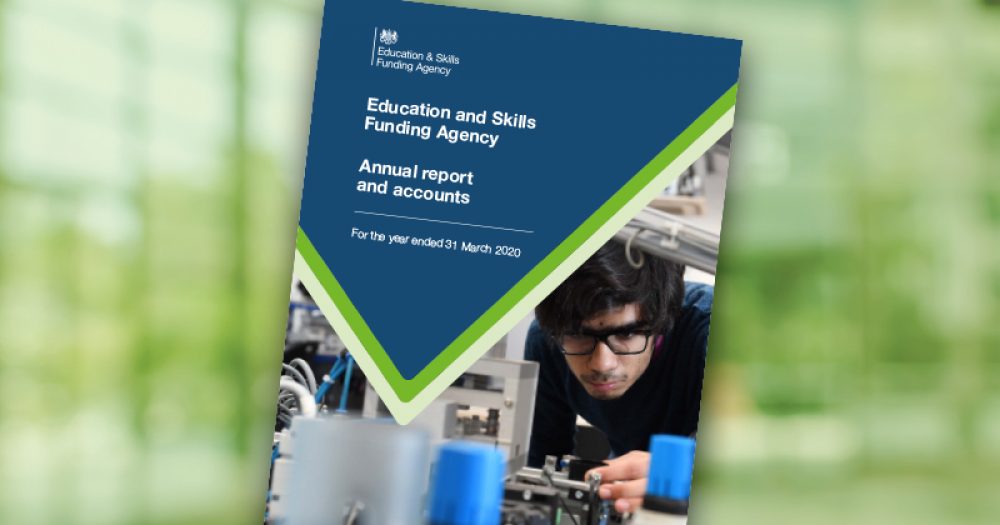The Education and Skills Funding Agency has this afternoon published its annual report and accounts for 2019-20, revealing academy trust debt write-offs, hefty fraud investigation costs and salary boosts for top civil servants.
Schools Week has the main findings:
1. Majority of academy trusts still ignoring pay warnings
One of the ESFA’s performance goals was to “challenge academy salaries” as part of its “commitment to increase the level of transparency and achieve appropriate use of public funds”.
But of the 105 trusts written to in 2019-20, just 42 have given a “written commitment to reduce the salaries identified through the high pay exercise”.
Schools Week revealed earlier this year how fewer than one in five trusts warned over high executive pay had actually cut salaries.
2. Nearly £5m of academy debt wiped
The accounts show that £4.9 million of debt owed to the government by academy trusts has been wiped. (Note: only debts worth over £300,000 are listed – so the true figure will be much higher).
The largest was £1.3m wiped at the Royston School Academy Trust. This seemingly relates to the King James Academy Royston, which according to annual accounts for last year, had a near £1.3m deficit.
The school is now part of the Diamond Learning Partnership Trust.
Other waived debts include £816,000 for the Avonbourne International Business and Enterprise Trust and £686,000 for the Steiner academies in Bristol, Exeter and Frome.
Debt is normally wiped to facilitate the transfer of the academy to a “more sustainable academy trust”, to support an academy or to aid with a school closure.
3. £823K overpayments at failed studio school written off
Overpayments usually relate to new schools that are initial funded on the number of pupils they anticipate to achieve, but then go on to underrecruit.
£823,000 of such funding has been waived at the failed Manchester Creative Studio school, which closed amid a series of problems. The government also waived £609,000 at Wigan UTC, which closed in August last year, and £539,000 at Baverstock Academy, in Birmingham, which shut in 2017.
The ESFA said it would only waive such payments in a “limited number of occasions… to support its wider policy aim to supporting education. One example is to facilitate the re-brokerage of an academy to a better performing multi-academy trust to strengthen the educational outcomes of the pupils.”
4. £1.4m paid to firms linked to ESFA board members
The accounts show £964,000 was paid to Hays Travel, a company owned by family members of ESFA chair Irena Lucas. She is also the chair at Hays, one of the UK’s largest independent travel agents.
A further £984,000 was paid to the firm in 2018-19.
Meanwhile, another £684,000 was paid to Voyage Care, were ESFA board member Stuart McMinnies is a non-executive director. The firm provides support for people who have complex needs.
5. Fraud continues to be a big problem
The agency was hit with frauds totalling £5.6 million in 2019-20, which mainly relates to two unnamed “specific cases” that are not yet in the public domain.
Recovery of the identified losses “remain ongoing”. During the year the ESFA was able to recover £8,119.
At 31 March 2020 the agency had a total of 82 live investigations and allegations to carry forward into 2020-21.
This comprises 19 on-going academy trust cases at “various stages” of the investigation cycle and similarly, 63 live cases relating to colleges and independent training providers.
The ESFA said the formation of new academy trusts and mergers continued to rise in 2019-20 with academies increasing by around 900 in-year.
Whilst there has not been a “significant” rise in the number of academy investigation visits compared to 2018-19, there is a “continuing slightly upward trend aligned to sector growth”.
6. Pay rise and bonuses for ESFA’s top officials
Chief executive Eileen Milner saw her salary increase from £140-145,000 to £150-155,000 whilst also bagging a bonus of up to £5,000.
Peter Mucklow, director of further education, saw his wage increase from £95-100,000 to £100-105,000 whilst receiving a bonus of up to £15,000.
The accounts say the pay boosts for both civil servants were made after they took on “additional responsibilities in 2018-19 which were reflected in their salary in 2019-20 and included an element of back pay”.
The only other ESFA official to receive a pay rise was director of academies Mike Pettifer – from £1150-120,000 to £125-130,000 – after he “took on additional responsibilities from September 2018 which were for the remainder of 2018-19 and for the full year in 2019-20.”
Pettifer was also paid a bonus of up to £10,000.
7. Learning Record Service data breach investigation ongoing
An investigation was launched in January after betting companies were “wrongly provided access” to an education database containing the information of 28 million children.
This was the sole “protected personal data related incident” for the ESFA that was judged significant enough to be formally reported to the Information Commissioner’s Office during 2019-20.
The ICO was notified that a learning provider, Trustopia, registered with the Learning Records Service (LRS), had been working with another company to use their access to the database for the purposes of ID verification for “non-educational purposes, in clear breach of their agreement with DfE”.
The personal data comprised of the name, date of birth, gender and postcode of 380,000 individuals registered with the LRS.
The ESFA’s accounts state that the ICO is continuing its investigation and will “contact the Department for Education once the investigation is concluded”.








Your thoughts